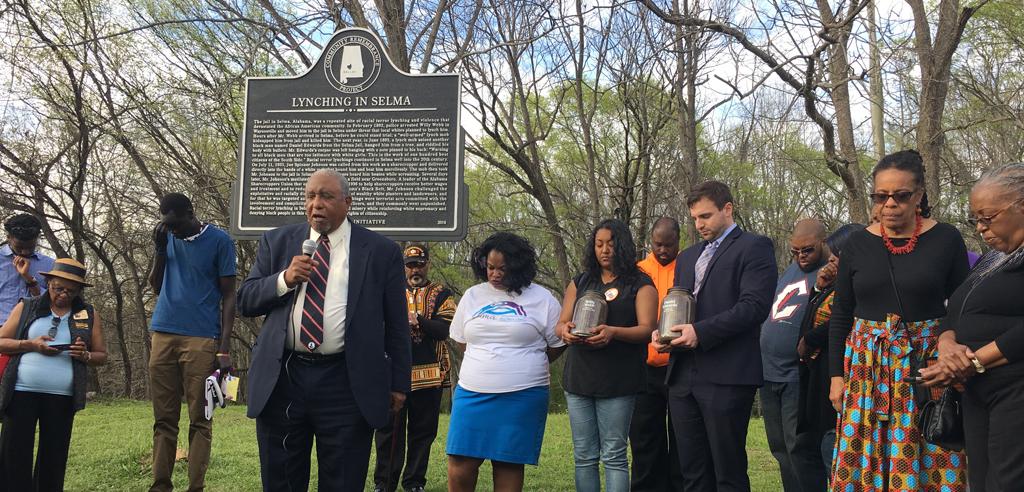This weekend, as Selma, Alabama, commemorated the anniversary of Bloody Sunday, the Selma-to-Montgomery March, and the Voting Rights Act of 1965, community members and civil rights leaders gathered with EJI in Selma to memorialize victims of racial terror lynchings as part of EJI’s Community Remembrance Project.
On Saturday, community members collected soil at the old Selma Jail, a repeated site of racial terror lynchings and violence that devastated the African American community. On Sunday, a historical marker was unveiled during a ceremony opened in prayer by Dr. Bernard Lafayette and featuring remarks and performances from local artists and activists.
EJI installed the marker in partnership with the Selma Center for Nonviolence Truth and Reconciliation at Healing Waters Retreat Center, Selma: Truth, Racial Healing & Transformation, and the Black Belt Community Foundation. It commemorates 19 racial terror lynchings in Dallas County, Alabama.
Racial Terror Lynchings in Selma, Alabama
In February 1892, police arrested Willy Webb in Waynesville and moved him to the jail in Selma under threat that local whites planned to lynch him. Hours after Mr. Webb arrived in Selma, before he could stand trial, a “well-armed” lynch mob kidnapped him from the jail and killed him.
During this era, it was not uncommon for lynch mobs to seize their victims from jails, prisons, courtrooms, or out of the hands of police. Though they were armed and charged with protecting the men and women in their custody, police almost never used force to resist white lynch mobs intent on killing Black people.
The next year, in June 1893, a lynch mob seized another Black man named Daniel Edwards from the Selma jail, hanged him from a tree, and fired multiple rounds into his body. Mr. Edwards’s corpse was left hanging with a note pinned to his back that read: “Warning to all Black men that are too intimate with white girls. This is the work of one hundred best citizens of the South Side.”
Almost 25 percent of documented racial terror lynchings in America were sparked by charges of sexual assault, at a time when the mere accusation of sexual impropriety regularly aroused violent mobs and ended in lynching. During this era, Black men were taught from an early age to be wary around white people, especially white women, because even the most innocent or accidental interactions, such as bumping into, startling, or being alone with a white woman could spark serious allegations and deadly violence.
Racial terror lynchings continued in Selma well into the 20th century. On July 11, 1935, Joe Spinner Johnson was called from his work as a sharecropper and delivered into the hands of a white mob that bound him and beat him mercilessly. The mob then took Mr. Johnson to the jail in Selma, where witnesses heard him screaming as they beat him. Several days later, Mr. Johnson’s mutilated body was found in a field near Greensboro. Mr. Johnson was a leader of the Alabama Sharecroppers Union, which operated from 1931 until 1936 to help sharecroppers receive better wages and treatment and to reduce inequality in Alabama’s Black Belt. Because he challenged the exploitative and racially discriminatory practices of wealthy white planters and landowners, he was targeted and lynched.
These lynchings were terrorist acts committed with the involvement and complicity of law enforcement officers, and they commonly went unpunished. Racial terror lynching in Selma created trauma and misery while reinforcing white supremacy and denying Black people basic rights of citizenship.
EJI’s Community Remembrance Project
“In this soil, there is the sweat of the enslaved. In the soil there is the blood of victims of racial violence and lynching. There are tears in the soil from all those who labored under the indignation and humiliation of segregation. But in the soil there is also the opportunity for new life, a chance to grow something hopeful and healing for the future.”
– EJI Director Bryan Stevenson
EJI collects soil from lynching sites as part of its Community Remembrance Project, a campaign to recognize the victims of lynching that includes erecting markers at lynching sites and creating a national memorial that acknowledges the horrors of racial terror in America. EJI believes that by reckoning with the truth of the racial violence that has shaped our communities, community members can begin a necessary conversation that advances healing and reconciliation.
Lynching in America
Thousands of African Americans were victims of lynching and racial violence in the United States between the Civil War and World War II. The lynching of African Americans during this era was a form of racial terrorism used to intimidate Black people and enforce racial hierarchy and segregation.
Racial terror lynching was most prevalent in the South. After the Civil War, violent resistance to equal rights for African Americans and an ideology of white supremacy led to fatal violence against Black women, men, and children accused of violating social customs, engaging in interracial relationships, or committing crimes. Community leaders who spoke against this racial terror were often targeted by violent mobs.
Racial terror lynching became the most public and notorious form of racial terror and subordination directed at Black people and was frequently tolerated or even supported by law enforcement and elected officials. Though racial terror lynching generally took place in communities with functioning criminal justice systems, racial terror lynching victims were denied due process, often based on mere accusations, and pulled from jails or delivered to mobs by law officers legally required to protect them.
Millions of African Americans fled the South to escape the climate of terror and trauma created by these acts of violence. Of the more than 350 documented racial terror lynchings that took place in Alabama between 1877 and 1950, 19 were in Dallas County.
Community members and civil rights leaders gathered with EJI to memorialize victims of racial terror lynchings this weekend.
